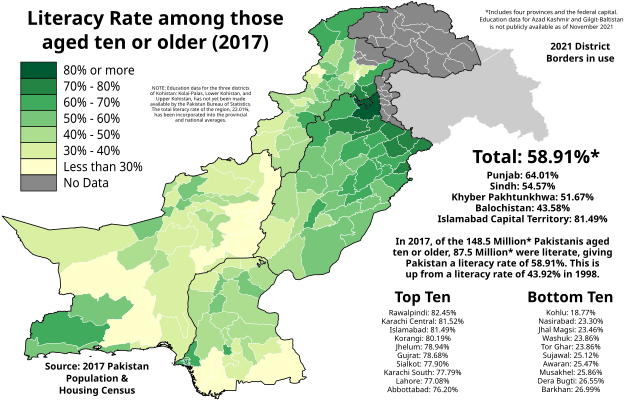Top Qs
Timeline
Chat
Perspective
Literacy in Pakistan
From Wikipedia, the free encyclopedia
Remove ads
Literacy in Pakistan is a key for social-economic progress. The literacy rate in Pakistan has seen gradual improvement over the past few decades, but it remains a significant challenge. According to recent data, the overall literacy rate in Pakistan is estimated to be around 62-68%,[1] with notable gender disparities. The literacy rate for males at 73-80% is generally higher than that for females 52-60%, particularly in rural areas, where access to education is more limited. Several factors contribute to low literacy rates, including poverty, cultural barriers, inadequate infrastructure, and a lack of quality education in certain regions. Efforts to improve literacy have been made through various government and NGO initiatives, but achieving universal literacy remains a long-term goal. Enhancing educational opportunities, especially for girls, and addressing regional disparities are crucial steps toward improving Pakistan's literacy rate.[2]

Literacy Rate in each Pakistani District as of the 2017 Pakistan Census
Remove ads
Literacy rate by Census
The definition of literacy has been undergoing changes, with the result that the literacy figure has vacillated irregularly during the various censuses. A summary is as follows:[3]
Remove ads
Literacy rate by Province and Federally Administered Areas
Remove ads
Literacy rate by Districts
Summarize
Perspective
Mean Years of Schooling in Pakistan by administrative unit
Literacy rates and development
Pakistan literacy rate is lower than other neighbours of it in South Asia at 62.8 percent, the second lowest in South Asia after Afghanistan which has a literacy rate of 37%. The male literacy rate is 73 percent and the female literacy rate is 52.84 percent. The female literacy rate drops to twenty-five percent in rural areas of Pakistan including Waziristan and Tharparkar. Girls' school enrollment also significantly drops in the rural areas of Pakistan. The enrollment rate for girls in rural areas is only twenty percent in grade school. Sixty-five percent of Pakistan's population is made up of rural citizens. Citizens in Pakistan face issues that affect their quality of life. Issues such as illiteracy are linked to poverty and lack of basic needs.
Parents with lower literacy skills struggle to understand health recommendations that can affect the development of their children. Malnutrition is a problem for children of parents who do not have a formal education status. Uneducated parents may not know the necessary proper nutrition needed for their children to adequately grow and develop. Malnutrition is associated with mothers who are illiterate and unaware of correct feeding practices.[20] There are several factors that contribute to the low education levels in Pakistan. Among the primary catalysts are unemployment, poverty, lack of awareness, teachers' absenteeism, a scarcity of quality educational institutions, and insufficient government oversight of educational institutions.[21]
A study published by the Research Journal of Commerce, Economics, and Social Sciences, discusses the importance of education. The study compares Indonesia, Malaysia and Pakistan. Education plays a huge role and is a crucial tool for overall improvement in well-being. Education helps jobs, upholds social justice and equity, social and self-awareness, and open mindedness. Education is one of the most important contribution a country can offer its citizens in the hopes of inequality and poverty. This study found differences in culture in Indonesia, Malaysia and Pakistan, as well as differing resources within the country. The data reveals that the literacy rate of Indonesia is 90%, Malaysia is 89% and Pakistan is 62.8%, significantly lower compared to the other two countries. In comparison to the other two countries, Pakistan has increased poverty and inequality within the country.
Remove ads
See also
References
Wikiwand - on
Seamless Wikipedia browsing. On steroids.
Remove ads
